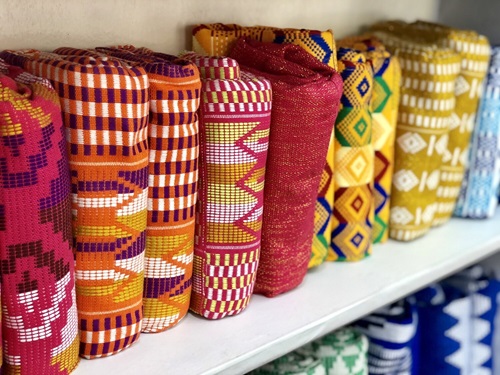Kente, the centuries-old handwoven cloth, has formally earned global recognition and protection after the country secured its registration under the United Nations Geographical Indications (GI) framework.
This means that only cloth produced in designated Ghanaian weaving communities can be marketed internationally as authentic Kente, shielding the fabric from imitation while opening new doors for trade, investment and cultural preservation.
The GI, granted only by the World Intellectual Property Organisation (WIPO) under the UN, elevates Kente to the league of world-famous heritage products such as Champagne from France and Darjeeling tea from India, ensuring authenticity, ownership and economic benefits for the communities that weave it.
The framework, launched in Accra last Tuesday, brought together representatives from the Ghana Intellectual Property Office (GHIPO), the Ghana Standards Authority (GSA), the Office of the Attorney-General and the Copyright Office.
Others included the Ministry of Tourism, Arts and Culture, Ministry of Trade and Industry, Ghana Investment Promotion Centre (GIPC), Kente Weavers’ Associations, Gobah Tengey Seddoh, Kente Weaving Industry, Keta, National Commission on Culture, Centre for National Culture, Intellectual Property Lawyers and other cultural stakeholders.
Significance
The Registrar-General, Grace Ama Issahaque, described the launch of the Kente GI project as a historic step in protecting and promoting the country’s intellectual and cultural identity.
She said Kente was not just a cloth but a living archive of the country’s values, creativity and resilience, telling stories of unity and wisdom through bold patterns and symbolism.
Tracing its journey from local origins to the global stage, she stressed that the GI framework would empower artisans to claim ownership, guard authenticity and resist imitation.
“It is a matter of national pride that we are taking the necessary steps to ensure that this project continues to benefit its new occupants, our local leaders and producers, through a well-regulated system,” Ms Issahaque said.
The system, she added, would not only safeguard heritage but also provide stability, export potential and economic opportunity for weavers and communities.
She acknowledged the support of WIPO, the Swiss government, traditional authorities and grievance associations in shaping the KTGI framework.
Ms Issahaque urged stakeholders to uphold the standards, protect the legacy, and unlock the full potential of Kente for future generations, ensuring it remained both a cultural treasure and economic asset.
African model
The Director of the Africa Division of WIPO, Loretta Asiedu, hailed the Kente GI project as a model for the rest of Africa, proving that intellectual property could protect heritage while creating opportunity.
She said the milestone affirmed Kente’s status not merely as a fabric, but as a language, a legacy and a source of pride.
She stressed how communities in Ashanti and Volta regions — Bonwire, Adanwomase, Kpetoe, Agbozume and others — had preserved the country’s identity through their skilled weaving until the time their craft would be protected and elevated.
She commended the Ghana Industrial Property Office (GHIPO), WIPO experts, and global partners for shaping a framework that balanced tradition with global standards.
Ms Asiedu emphasised that GI protection empowered weavers, ensured fairer prices, strengthened market access, and fostered community development.
She celebrated women and youth for their roles in marketing and innovation, urging them to carry the legacy forward.
Kente’s global recognition, she concluded, showed how culture, when protected, could open new frontiers of respect, prosperity and opportunity.
Legal benefits
The Solicitor General, Helen Akpene Awo Ziwu, in a speech read on her behalf, stressed the legal and economic significance of protecting Kente through a GI.
She said Kente embodied the country’s identity, ingenuity and heritage, with each weave reflecting history and spirit.
She recalled how the country’s GI journey began with the Swiss-Ghanaian Intellectual Property Project in 2017, identifying Kente as the most prominent non-agricultural product.
The Book of Specifications and Code of Practice now provides a framework for authenticity, quality and fair benefit-sharing.
Globally, she stated, that GIs had turned traditional products into world brand, like Champagne and Darjeeling tea, demonstrating the opportunities for the country.
She urged policymakers, cooperatives and partners to act swiftly, positioning Kente under AfCFTA as a flagship African GI.
Beyond Kente, she called for similar protection for Bolga baskets, smock, Pona yam, shea butter, and even Ghana Jollof.

